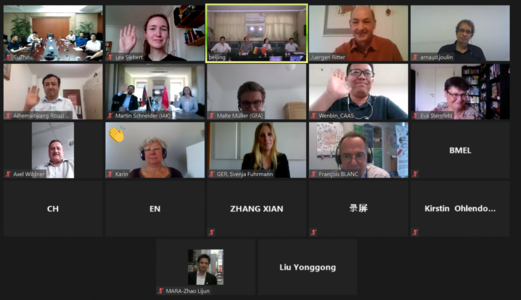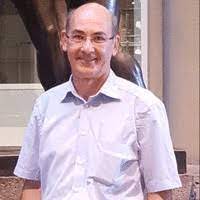Smart agriculture is this year’s key topic in the DCZ Agricultural Policy Dialogue. Originally, a study visit on this subject to Germany and France was planned, but due to the COVID-19 pandemic a physical study visit had to be cancelled. Instead a virtual tour on the topic Smart Agriculture is being implemented.
In preparation of this virtual study visit on Smart Agriculture the DCZ organized an online Kick-off Workshop on August 5, 2020. This was preceded by the elaboration of a concept paper and internal communication of the management team and external experts. The Kick-off workshop, therefore, served the purposes to introduce the planned activities to the main stakeholders at the two ministries, the German Ministry of Food and Agriculture (BMEL) and the Chinese Ministry of Agriculture and Rural Affairs (MARA), to discuss further details and receive feedback for the next steps.
After a short introduction by the two managing directors of the DCZ, Mr. Tang Zhishao and Dr. Jürgen Ritter, representatives of BMEL and MARA addressed the 29 participants of this online workshop. Dr. Steffen Beerbaum, Head of the BMEL Division on Application of Digitalization in Agriculture, presented the situation of smart agriculture in Germany, and emphasized the objectives to make agriculture more sustainable and efficient in light of the challenges related to population growth, limited resources and economic considerations. An example of the BMEL’s efforts in the promotion and research conducted in this field are the 14 trial fields established by the ministry to demonstrate available technologies and research on advantages and disadvantages from an environmental and economic point of view. This field work is coordinated in cooperation with universities and companies.
After some follow-up Q&A, Mr. Wang Bin, Deputy Director-General of the Department of Policy and Reform in MARA, outlined the situation on the Chinese side and stressed the significance of the development of smart agriculture for the Chinese government as seen in various policy documents, e.g. the “Rural Development Plan for Digital Agriculture” of December 2019. Smart Agriculture contributes to the wider objectives of rural re-vitalization, modernization of agriculture and promotion of green development. Also, it is a means to address labor shortage and to improve rural governance.
In his presentation titled “Digitalization empowers China’s agriculture development” Prof. Wu Wenbin of the Chinese Academy of Agricultural Sciences (CAAS) further elaborated on the status and the future of digitalization China’s agriculture. This was followed by a presentation of Dr. Martin Schneider on “The Status of Smart Agriculture – Concept for a Virtual Study Tour” in which he outlined and detailed the plan for this activity with the aim to conduct relevant interviews at different levels of decision-making as well as incorporating experiences by practitioners. A website dedicated to the topic of “Smart Agriculture” will be developed and then provides access to these video-recorded interviews as well as to presentations and other relevant outputs.
Mr. He Jianhua of the Bureau of Agriculture and Rural Affairs of Suzhou presented the efforts and achievements of Suzhou City regarding smart agriculture. With an area of 75000 mu of IoT application, different pilot areas for various smart agriculture technologies, E-commerce and a B2B virtual platform for farm products Suzhou is at the forefront of the development in digitalization of agriculture.
Besides the high-level participation of BMEL and MARA, also the Agricultural Counsellor at the French Embassy in Beijing, Mr. François Blanc, as well as Mr. Arnaud Joulin of the DRAAF Grand Est Mission Agro-Ecologie et Innovation, attended this meeting and will provide valuable contributions to the DCZ virtual study visit on Smart Agriculture.





